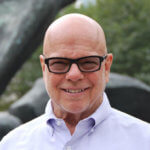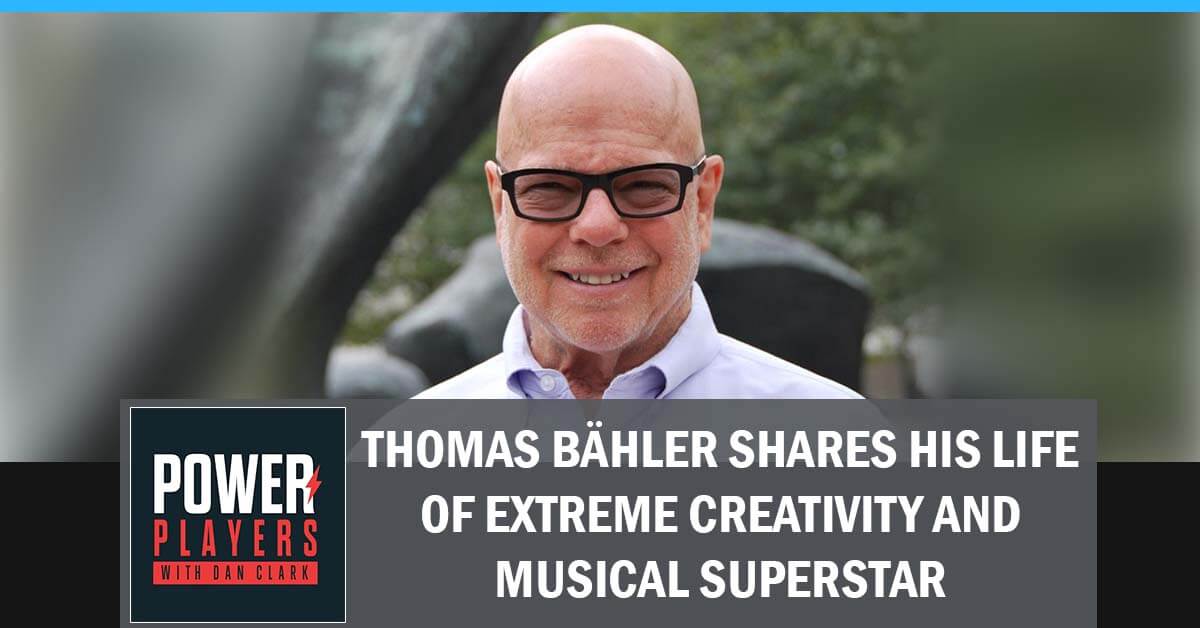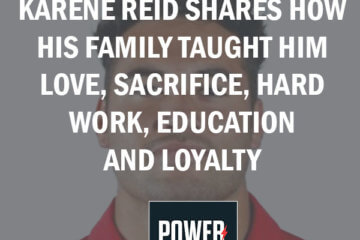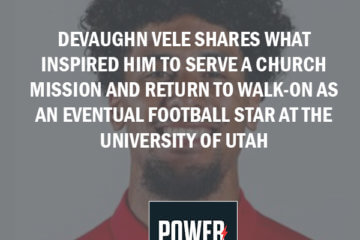Listen to the Podcast Here
Songs are considered to be a universal language. Several music superstars have released life-changing music, and even years later, people remain in awe of its lyrics, melody, and arrangement. One of the few songs that remain iconic is Thomas Bähler’s “She’s Out of My Life” recorded by Michael Jackson. In this episode, he sits with Dan Clark to share his life of extreme creativity and how he used this to excel in music and songwriting. Tune in and learn more as Thomas gives us a glimpse into the life of a musical superstar.
—
Thomas Bahler Shares His Life Of Extreme Creativity And Musical Superstar
This is an interview with Grammy Award-winning singer, arranger, conductor and composer, Tom Bähler. In this episode, my friend and colleague Tom Bähler, best known for writing the hit song She’s Out of My Life recorded by Michael Jackson and for being the associate producer with Quincy Jones on We Are the World and for producing the music for the Miss USA, Miss Teen USA and Miss Universe pageants, shares his life of extreme creativity, having worked with Frank Sinatra, Billy Joel, BJ Thomas, Neil Diamond, Sonny & Cher, David Cassidy, Jan and Dean, Michael Jackson and being the background vocalist for the television series, Partridge Family recordings throughout the 1970s. He’s giving us an inside glimpse into the life of a superstar who has sung, produced, and arranged hundreds of worldwide hits.
—
Thomas created vocal arrangements for the landmark charity event called We Are the World teaming up with Quincy Jones, whom I had the opportunity to meet several times because we have a mutual friend, Kareem Abdul Jabbar. To see that you have worked with Barbra Streisand, Billy Joel, and the motion picture version of The Wiz.
Thomas Bähler has served as musical director for a number of events sponsored by the White House, including America’s Millennium Points of Light and President Clinton’s inaugural concert. Mr. Thomas Bähler, as I shared with him off-camera, says, “You can call me Tom, Tommy, Thomas.” I said, “I’d better settle in on your majesty.” As a songwriter, you got to understand that I would write a song about you but I don’t know what rhymes with a hunk of burning love.
He’s even served as musical director and arranger for the Kennedy Center Honors. My favorite of all was Led Zeppelin because I’m a classic rocker. I’ve been a guest on Adam Carolla Show and his co-host at the time was Danny Bonaduce. Your connection with the Parkers family, for some unknown reason, excited me as much as you writing She’s Out of My Life. Let’s start our interview. Right at the beginning, how did you and your famous brother find your passion in the world of music/high-level entertainment?
I grew up around it. My father used to play. Jack Bähler is his name. He used to play in the studios in the ’30s. He was a trumpet player and also a cellist. We had music in our home. My mom was from West Virginia. She couldn’t read a note of music but she could sing it. Dad always said that my mom was the most musical person in our family.
I was around music all the time. My mom used to sing to Too-Ra-Loo-Ra-Loo-Ral to me when I was 2 and 3 years old. No matter where I was in the house, she would sit. It was a tiny thing. It was a child’s rocker that my grandmother had given. My mom could sit in that and sing Too-Ra-Loo-Ra-Loo-Ral wherever I was in the house. I’d come running in and jump on her lap.
It was a safe place. The music was always pleasant and wonderful. My dad was in it. By the time my brother and I came along, he had stopped playing for a living and opened a record store and also had a jukebox shop. We had music and records around us all the time. My mom went to church Tuesday nights, Friday nights, Sunday mornings and Sunday nights. I was with her. We went to a church called the Sky Pilot Revival Center, which had about a hundred voice Black choirs. My mom was the first White soprano in the group. It was led by Doris Akers, who is now in the Smithsonian Institute.
I avoid the word blessed because it somehow separates some things but I feel very fortunate to have grown up around all of these things. My dad was a great philosopher and my mom was a great woman. She used to tell me, “Tommy, when you notice something nice about someone, even if they’re a complete stranger, tell them. You will make their day.” I did that later on in my career with Henry Ford II. This is the thing that I learned when I was three. You talk about the timeless issue.
Everything that you described for me was that you were talking about humanity. You were talking about the different aspects of humanity. What I love about humanity with what’s going on with the COVID-19 thing is that we are adjusting. Now we’ll grumble and moan. That’s what we do as humans too. We complain, “Why does it have to change? I don’t want to change,” but we do it when we know it’s good for us and others. I’m in music because I love human beings. I found that I had a talent for music and it was a way to serve others through something that I enjoyed doing.
When you notice something nice about someone, even if they’re a complete stranger, tell them and you will make their day.
Through what your mother taught you that if you see someone doing something, tell them. Trisha Yearwood sings The Song Remembers When. Let’s dive right into the formula for writing a song, which seems to be the universal language on the planet as we’ve traveled but the best way to communicate with someone in an emotionally connecting way.
Teach us a little bit about how you transposed what your sweet mother taught you, what you experienced going to church, experienced in your home, experienced from your dad, and how that prepared you to be a hit songwriter where you can edit so every word paves its own way and says what you want to say in the shortest amount of words or melody in a 3 minute and 40 seconds in the song. Teach us about that process.
I can certainly relate it to you. It’s one word, listen. My dad always said, “My feelings are my best barometer. When I follow them, everything works out. When I don’t follow them because they’re there anyway then I end up regretting it.” Being around music all the time, one day, I heard a melody. I was maybe four years old. I said, “Dad, I hear a melody.” He said, “I have a suggestion.” I said, “What?” He said, “Write it down.” I learned how to read and write music before I learned how to read and write English, not because my father wanted me to but because I had a curiosity for it. My dad fed that. My dad, for several years, never once told me what to do but he was present. He was there.
I couldn’t ask too many questions, which I couldn’t say to anybody else in my family. They used to go, “Tommy, not another one.” My dad was my hero. He said, “I suggest you write it down.” I said, “Good idea.” I grabbed the pencil. I start writing. I said, “Dad, I’m hearing the same melody but it’s two ways. It’s different. I don’t know which one to choose.” He said, “Do you need to make a choice now? I suggest you write them both.” That’s the way I learned to write. Like I said, we own a music store. We have a jukebox route with 54 different spots, which my dad called. We were around music all the time. We played classical music at home, as well as opera. We loved it all gospel and country.
Growing up in that environment, dad encouraged me to listen when I felt something. I grew up learning that if I call my intuition, my connection to God, those are all labels. Call them what you want but it’s the same energy. We all know that. To me, she’s a female because women give birth. That’s where ideas and concepts are birth. All I need to do is say yes. You’re going to love this. When I first met Quincy Jones, we had talked for ten minutes. I said, “Do you wake up in the middle of the night with tunes going through?” He said, “All the time.” I said, “Do you write them down?” He said, “Yes, otherwise, they’ll go to Mancini’s house.”
He’s one of the most quotable men since FDR. He talks all the time. He’s the most generous spirit I know. He was speaking at a university. He always takes questions. This young woman stood up and said, “Mr. Jones, how do I keep from being discouraged? This business is so hard.” He said, “My dear, if you can be discouraged, you should be discouraged.” That was not a pretty thing to say but isn’t it the truth? Is that a beautiful thing? It takes me back to Henry Ford where he says, “Whether you can or whether you can’t, you’re right.”
Let’s dive into listening and the songwriting process. Relate it to the average Joe and Jill on the street, who isn’t a hit songwriter but the process has to be the same. Do you focus on a story? Do you focus on writing a hook? How do you take this concept of what you want to say to someone, to the world then consolidate it into a message? How do you do that? That would help entrepreneurs, the sales process and spouses. It would help anyone who wants to finally tune their communication ability. There’s a magic that you have to share.
It’s like having children. Every one of them is different. When I wrote She’s Out of My Life, I was coming home from another vacuous date, which wasn’t the woman’s fault. It was my fault. It was a vacuous date because I was still in love with somebody I said no to and she was gone. Have you ever been so frustrated and agitated that you started talking to yourself out loud? I was on the Pasadena Freeway and I said, “She loved you. She wanted to marry you. You’re the guy that said no. Now deal with it. She’s out of your life.”

Musical Superstar: You never retire. You just refire because of your passion and because you’re driven.
As soon as I said those words, it was a drunken cowboy kicking down the doors of a saloon. It came in melody and lyrics, “She’s out of my life, she’s out of my life and I don’t know whether to laugh or cry. I don’t know whether to live or die and it cuts like a knife.” This came in like this. Normally, every song, story, and book that I write sometimes starts as a surprise. It’s never the same twice until they’re having children. My daughter, after two children, said to her husband, “No more babies are going through this body.” He said, “Cool.” Three months later, she was pregnant.
I said, “What happened to your declaration?” She said, “God had a different idea.” You go with the left brain and right brain thing but normally, I write something that I’m very excited about. It’s a broad thing like We Are the World. It’s an anthem. I read a book that inspired me. Once I’m inspired, I let it soak. I said, “I’m inspired.” I’m opening myself up to listen because my right brain speaks to me in feelings. She’s never said a word to me but she smiles. I get the feeling then it grows out of my heart. There’s my left brain, which knows everything that I know but doesn’t have a clue about what’s going to happen next because that’s not its job. Its job is to protect me and to warn me.
I remember when I decided to write my first novel. I made the declaration to myself, “I’m going to write a novel,” because I had created this musical and there was too much story. A writer friend of mine said, “Write a novel.” I said, “I’ve never written a novel.” He said, “Tom, there was a time when you had not written a song.” I went, “Oh,” so I declared I was going to write a novel. My left brain attacked me, “What are you doing? You’re a fool. Look at what you’ve done in the music business. Look at how well you’re doing. Now you want to start something new at your age? Are you crazy? You’re going to embarrass yourself.”
For the first time, I had an epiphany because, normally, I realized that I was the king. My left brain works for me and so does my right. They’ll go away if I want them to but the left brain will be pissed off. This one will go to Mancini’s house. What comes in is I say yes to it. I wrote a book about this too because it’s about my family experiences and our family philosophy. I loved your three Ps. It’s great to have a handle on something you can pull down. I have a formula, which is to declare what you want. Be a good host. Declare you’re taking action and thrust like a teakettle.
How did you come up with that?
It’s because I was raised with it. My grandmother, my dad’s mom, was widowed at 26. She was beautiful. Her husband got one of those diseases now that we’d take a shot for. It was something fever. Here she was, 26 years old. They lived in the little town of Willow Springs, Missouri. My grandfather was a postal inspector. My grandmother stayed at home, played the piano, kept the house, cooked, and was mother to my dad.
At 26, her husband dies. The other thing is she was beautiful. Her friends in the neighborhood didn’t invite her over for dinner. To her, it wasn’t a complaint. It was an observation that women protect their nests. I’m like, “Of course, they didn’t. You’re way too hot.” She’d have coffee with her at a coffee shop somewhere like, “Not my home, babe.” I was raised with that philosophy on it. When I said, “How did you feel when grandpa died?” She said, “Why me? I’m a good wife. I’m a good mother. It’s not fair.” The hole kept getting deeper.
Finally, she said, “I guess the good Lord planned this but I asked the question. What do I want?” It took me out of the pity party and put me in a place of possibility. I said, “Tell me more.” She said, “What do I want?” The answer was, “I wanted my husband back.” Now, I’m in an interior dialogue with myself. My self says, “That’s not going to happen. What else do you want?” She said, “I want to stay home with my son like I’ve done all the whole time.” My self comes back and says, “That’s a possibility. What are you going to do about it?” She thought, “I liked numbers.”
Your feelings are your best barometer.
She took a correspondence course and became an accountant like you do on an online course nowadays. She was a doer and this formula grew out of that because my dad was infected by it. She had it. I remember when she was visiting. I was about 4 or 5 years old. I was frustrated. My dad or mom would never ask me what was wrong. They say, “Are you okay?” I said, “No.” Grandmother said, “It looks like you’re frustrated.” I said, “I am frustrated.”
She said, “I know that feeling. It’s a terrible feeling but do you know when I found out? It’s usually caused by an obstacle.” I go, “It is. There is an obstacle.” She said, “I learned a way to look at obstacles that are fun.” I said, “Obstacle is fun?” She goes, “When I see an obstacle, I either go over it, under it or around it. All the time I’m spending this extra energy, it reinfused what I desired in the first place.”
That’s brilliant. Of all the questions I could ask you, why do you continuously pursue this passion for changing the world through music through entertainment? We have a mutual friend, Ken Kragen. He called me back when he was teaching at UCLA. He came up with his little series. I helped him get into the public speaking world.
You did.
Her sister was one of the twin clowns from Barnum and Bailey if you remember. Kragen and I spent a bunch of time together. He was the first one that illuminated in my mind that you never retire. You refire because of your passion because you’re driven. Let me shift the question and ask you to give us a little historical background on We Are the World. How do you conceive such a huge idea, believe that you can take action on it and turn it into a reality? Teach us a little bit about that process and how you hooked up with Quincy, Michael, Lionel and everybody involved.
Ken Kragen and I met when I did the Smothers Brothers Show, which was my first sojourn into big-time TV. I was one of the group’s singers on the Smothers Brothers Show. What a lesson that was. Ken Kragen and I have known each other since 1967. I love that man. When the whole thing came to us, Quincy and I were working together constantly. We even had a company that we scored pictures with. He called and said, “I’ve got this new thing. Come on over,” and he told me about it.
It started out with a team and you know the history of that. I don’t need to tell you that. We got the song and Lionel wrote it. Quincy heard it and said, “I think Michael should kiss this.” Michael loved it and did it. The song came out beautifully then we started. Here’s Ken Kragen’s genius. The reason that we’re doing it when we do it is that the American Music Awards are in Hollywood and all the stars are going to be there. Otherwise, how do you get them all yet? Let alone in one room.
Ken is the event realm. His hand’s across America. Go try to do that. In fact, he says it. He makes the impossible possible. This is all flowing, beautiful energy going. Quincy said, “I want you to do the vocal major.” I said, “Cool.” He said, “I only have two requests. One is that I’d like for Lionel to sing the first line.” Lionel wrote it first and then he gave it to Michael. I said, “Cool.” He said, “I think Michael should sing the first chorus.” Some people think that Michael and Diana are the same people. Put them both on the chorus and they’ll know that they’re two people.

Musical Superstar: Believe that you can take action on it and turn it into a reality.
She was like a mother to him. They had the most beautiful relationship I’ve ever seen. It went light years beyond what a relationship is between a man and a woman but it was the most beautiful thing ever. He said, “I’d like her to join him in the chorus and the rest of it is yours.” For me, it was jumping in one of those little blow-up things when you’re a little kid and a bunch of balls. You got everything. You have so many things around you. It took me all of 30 minutes to do that vocal I mentioned. I’ll tell you why and this is what I’m talking about listening.
I knew I had worked with about half the artists anyway so we knew each other. Not that it would make any difference in this situation but it was nice because I knew their proclivities as human beings. I knew what each line meant. I knew that Steve Perry was made for this. The second chorus was all the boss. All I had to do was listen to that. They all pick themselves out. I swear, I wrote their names in the column and that was it. It was done. It took a lifetime to do that. One time, Picasso was sitting in a cafe in Paris and a lady came and said, “Pablo Picasso, please write something on a napkin for me.” He did and said, “That’ll be $5,000.” She said, “That took you three seconds to do.” He said, “No, my dear. It took a lifetime.”
I love it. As we wind down our time, let’s talk about your body of work. What do you personally believe is your most significant achievement? I know it’s the Partridge Family but let’s not spend a lot of time on that.
The Partridge Family didn’t mean a lot when we did it. We had a ball. We didn’t know if it was going to be a hit. We were glad it was a hit. We had a great deal going with the company. We made a lot of money. They made a lot of money and I love David Cassidy. I love the whole cast. There is a cast of characters. That was all cool. I have favorites in many things. For the longest time, I didn’t have an answer. After we did We Are the World, that is the single most significant effort I’ve been a part of. It was fun. It flowed. It wasn’t a problem. Quincy was the general of that thing.
When you have a general like Quincy Jones, you follow him. I can see why people follow Napoleon. Quincy’s no Napoleon but you know what I’m saying. It’s that dedication. I’ve known him for several years and he has yet to say anything that isn’t the truth. He’s never ever disappointed me with anything he said. It’s amazing. One night, we were hanging out. I said, “Q, I’m telling my dad you’re the most important man in my life.” He got a tear in his eye. That’s him.
He’s involved in when I’m going to tell you next because my most significant song to me is She’s Out of My Life. Most of the songs I wrote about are through my intuition or what the producer would say. When I wrote Living In A House Divided for Cher, Sonny said, “Do you know the song United We Stand Divided We Fall? That’s a political statement. It’s been made into a love song. That’s what I want. Write something like that then throw some Kings and Queens in it.” That’s snuffy but I love that because he gave me a big box to play in but it was a box. It was interesting because one of my best friends was in our sixth generation of friendship with our families. He had left his wife, was living with me and we got along great.
All of a sudden, our girlfriends were like, “You can’t have two Queens in one house,” thing. We were living in tension. That was on my mind, “How do I deal with this?” I love everybody involved. I don’t dislike anybody but with the tension of this room, you can cut with a knife. That’s not what I wanted in my home. It came to me Living In A House Divided. I thought, “There is your political statement.” I have the Kings and Queens. This is the second verse, “Look at us, the king and queen of emptiness living inside our castle of loneliness.” We got that covered too.
I’m listening to what you learned when your 26-year-old grandmother lost her husband, “Let’s make sure this house stays glued together. Not let it become a house divided.” You’re brilliant. Barbra Streisand is my wife’s favorite artist of all time. When she came out of retirement for the first time, my wife and I were at Marvin Hamlisch’s wedding in New York City. He invited us when he was the musical director for Barbra coming out of retirement at the MGM Grand over New Year’s Eve.
If you can be discouraged, you should be discouraged.
We sat right behind Quincy Jones and his daughter was dating LL Cool J at the time. I stopped by and sat by Coretta Scott King, Dr. Martin Luther King Jr’s wife. That was our section. That was our row for the concert. I would be remiss if I didn’t ask you. Give me a personal insight into working with Barbra Streisand and Billy Joel, who are two iconic, forever amazing artists. Do you get any insight on what makes them so extraordinary?
All the people that we’ve talked about share the same qualities. Your three Ps cover it. My formula covers it. To me, it’s integrity. Integrity is the most important factor in a long relationship of any kind. That’s why I say in several years, Quincy has never said anything where I went, “What the heck is that?” We have it with our buddies. We go, “I didn’t know you felt that way. It’s weird but that’s okay because I have a beer with you or play golf with you or whatever.” It’s a close intimate relationship. When I found Diana Ross with Barbra Streisand, one of the best voices I’ve ever heard in my life. Maybe the best. I loved working with her. My brother did some vocal arrangements for her. This was on the ButterFly album.
Barbra has the most beautiful hands in the world. Everybody I’ve ever heard talking about Barbra mentions her hands. She’s producing the session and we’re doing the backgrounds. We’re out there singing. We come in and she has her hands on what we call the desk but it’s a board. My mom said, “When you notice something nice about someone.” I learned and said, “You have the most beautiful hands I’ve ever seen.” This came from my heart. It was the truth. She looks up at me with the nicest smile. She said, “Thank you.” I know she had heard that a million times but I was unconscious of what came out of my mouth next because I said, “Do they scratch backs?”
She said, “Yes, they do.” I said, “Mine is available.” She got up from her producer’s chair and said, “Sit down.” and she scratched my back. We sang five songs that night. After every talkback, she’d get up and I’d sit down and she scratched my back. That was a beautiful human-to-human experience. If I would have had any other thoughts, like, “Isn’t this cool Barbra Streisand’s scratching my back?” I almost don’t like to tell this story because you think that’s not the way I felt at all. Barbra is honest. If you want to know the truth, ask her a question. She can’t say anything but the truth.
With Billy Joel, when they called me, I said, “Why aren’t you calling me, Billy? You’re the best vocal arranger on your own song. I can’t do any better than that.” He said, “I’m writing this one.” He and Christie got together. It’s An Innocent Man album. He said, “I’m writing in the style of all of the genres that shaped me.” I thought, “What a beautiful concept for an album.” He said, “I don’t want to take the time and energy to pour into doing a vocal arrangement for this and that when I’m writing songs.” I said, “I get it. Cool.” That was great. I loved it went back. He was writing the album as we were recording it.
One day, I’m talking to somebody. I’m leaning on the piano, which has this soft cover when they’re not being used. I’m talking to somebody who happens to be on the bench. I feel this body come up and stand next to me. I looked over. It was Billy. He opens up a spiral notebook and writes for the longest time. He starts writing a lyric. I know that this lyric is already in his head. He’s not thinking of it. We don’t even do that when we write a letter.
We don’t sit down and go, “Dear mom, I love you.” He writes in. I’m in a conversation over it but I’m glancing and watching him work. I’ve not seen him do this and it was very interesting. He turns the page. He doesn’t write the title but starts to write the lyric again. I noticed the words are too different. He turns the page again and does the same thing. I swear he did this twenty times.
He finally shuts the book and looks at me. He says, “What?” I said, “Billy, I’m a songwriter too but I understand. When I’m writing a song, I say a word and then think of something else. I scratched that one out.” He goes, “No, I don’t do that.” I said, “Obviously.” For me, to scratch something out sends a message to my subconscious that I’ve made a mistake. This is a process. Is that beautiful? These are the genre of people we’re talking about. They’re all individuals. They all have their likes or dislikes. Maybe why I’m so comfortable in that realm is because I was raised with, “If it talks to you, do something. If you don’t feel like it, that’s okay too.”

Musical Superstar: We don’t attract who we want, we attract who we are. We attract what we believe we deserve.
Let’s wind down our time. You’ve worked with the most elite, talented, and passionate entertainers songwriters, and performers in the world. Through the law of attraction, we don’t attract who we want. We attract who we are. We attract what we believe we deserve. We’re not talking about some obscure name. We’re talking about Barbra Streisand, Billy Joel, Michael Jackson, and Quincy Jones.
One final question. Let me put you on the hotspot here, Tom. You have one hour to live. You have one chance to give the last lecture to leave to the world. What one quality do you think has attracted not only these amazing superstars to you and you to them but to each other to create this highest level of songwriting and performance?
There’s a giant difference between listening to Celine Dion sing God Bless America and a national karaoke champion. They’re singing the exact same song and hitting the same notes. You got to illuminate what is this quality that they all share that you and Quincy Jones also share so when you get in a room, there’s no disconnect. It’s always connecting at this highest-level producer, writer, performer, and all of the above.
Passion. I’ve never done anything for money. I’ve done very well in that department but I’ve never done anything for money. I do it because I believe that I’m the right person. My dad used to say this. He said, “This dream picked you son.” I said, “What does that mean?” He said, “To me, it means that nature, the universe, God picked me to deliver this to the human.” It doesn’t mean I’m special because we all have that quality.
All we need to do is recognize it. He used to talk about energies that want to be recognized, even if it’s in a hanger. When we feel good about something, you say, “Thanks for holding my shirt up.” It’s funny but what could be wrong with that? I grew up with that whole thing and I’m attracted to that. All the people we’ve talked about now are like that. I worked with Michael from the time he was thirteen until his last studio recording. Never in several years did I hear a discouraging word from him.
My middle daughter was in all the High School Musicals especially High School Musical 2. We, as a family, became friends with Kenny Ortega. Such a fan of Michael Jackson. We’ve seen him live in concert a couple of times and had tickets for his tour in Europe. He toured right before he passed away. That’s one of my connections with you in a very interesting way.
I love that we have these musical connections. That’s cool especially with Kenny. I love Kenny. I’ve known him since I was eighteen years old.
On another day, we’ll talk about Kenny Rogers and our connection with him. I want to have you back. I honor you. On behalf of all my audience, we love you. You’re fascinating. You’re a walking encyclopedia. You’re a national treasure. It’s been such an honor to pick your brain. I want to have you back until we meet again. As I always conclude on my show, it’s called power players for a reason and now you know why. Thomas Bähler has helped us understand those timeless truths, character qualities, character traits, and core values that allow us to bubble to the surface of every single conversation in every single industry. You happened to be blessed to be that conduit from heaven to earth through music and entertainment. God bless you. It’s an honor to call you a friend.
I feel the same way.
Remember what Thomas Bähler has taught all of us. You need to go make a power play and the power play is already inside of you. You need to hang around with the right people who will trigger more passion, creativity, imagination, preparation, and pursuit of that passion and creativity, as we’ve talked about on the show. Thank you, Mr. Bähler, your majesty. Mr. Hunk, a hunk of burning love.
Thank you, Mr. Clark. I look forward to it. This was such a pleasure. Thank you and to all your people.
Important Links
- Tom Bähler – LinkedIn
- Quincy Jones
- Kareem Abdul Jabbar
- Adam Carolla Show
- Danny Bonaduce
- Smithsonian Institute
About Thomas Lee Bahler
 Thomas Lee Bahler is an American singer, composer, songwriter, arranger, producer, and author.
Thomas Lee Bahler is an American singer, composer, songwriter, arranger, producer, and author.
He is the younger brother of singer, arranger, conductor and composer John Bahler. Bahler is most known for his song “She’s Out of My Life”; recorded by Michael Jackson, the song was originally written for Frank Sinatra, who never recorded it.
In Bahler’s early career, he worked with Jan Berry (of Jan and Dean). Later, he and his elder brother John were vocalists in the Ron Hicklin Singers. Together with the Wrecking Crew, the Bahler brothers have sung, produced, and arranged hundreds of worldwide hits. They were the featured background voices on The Partridge Family recordings in the 1970s.



